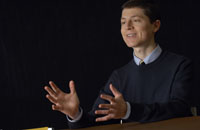Your endurance calculator is now online


I have. I've done a half-marathon and once even completed a bicycle marathon of 112 miles.
But my best endurance days are behind me. These days I'm happy with a 10 km Peachtree Road Race in the summer and maybe a 37 mile ride down the Silver Comet Trail in the fall.
One reason is because I fear "the bonk," that hopeless feeling you get after 22 miles when you just hit the wall and can't will yourself to keep up the pace. I suffered it a few years ago when I tried to go both ways on the Silver Comet, a total of 74 miles, on a 95 degree day. My dear wife had to come get me.
Now Ben I. Rapaport (right, from MIT) who is going for both his MD from Harvard and his Ph.D in electrical engineering from MIT, all while running competitive marathons for fitness, has an answer.
It's this endurance calculator, which he describes in the current issue of PLoS Computational Biology.
From your age, your weight, and your resting pulse, the calculator tells you the energy you will need to run a marathon, how much you will have to eat beforehand, and even whether your target time is attainable.
Rapaport explained to a reporter that the bonk comes when you run out of ready carbohydrates. Fat is a less efficient energy store than carbs, and it's when your body starts burning fat that you hit the wall.
What is presently online is only a very rough approximation. Rapaport can make a better, more customized estimate if he knows your VO2Max -- your maximum ability to process oxygen -- which is calculated from a treadmill test.
The present system just estimates the figure. (It calculated mine at 27.) You can make that estimate yourself by comparing your resting heart rate to your maximum rate, which is usually 220 beats minus your age. Or see how far you can go on a treadmill in 12 minutes.
In either case, Rapaport thinks that with proper training I could possibly run a 4:52 marathon if I put away 4,090 calories beforehand. That's a bit more than 4 regular servings of spaghetti with meatballs, with tomato sauce.
Cool. But this can go much further.
I can easily see this turned into a hand held device, or a SaaS service, that will let you plug in the type of endurance contest you want to do, follow your training, and then give you your final meal instructions at the end of the process.
Not everyone does marathons, but anyone can walk the Peachtree Road Race, or ride the Silver Comet Trail, or target any one of thousands of different endurance events held around the U.S. every month.
I know MIT and Harvard are expensive, but a little birdie tells me those tuition bills can be paid for.